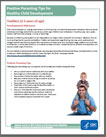Toddlers (2-3 years of age)
 Developmental Milestones
Developmental Milestones
Skills such as taking turns, playing make believe, and kicking a ball, are called developmental milestones. Developmental milestones are things most children can do by a certain age. Children reach milestones in how they play, learn, speak, behave, and move (like jumping, running, or balancing).
Because of children’s growing desire to be independent, this stage is often called the "terrible twos." However, this can be an exciting time for parents and toddlers. Toddlers will experience huge thinking, learning, social, and emotional changes that will help them to explore their new world, and make sense of it. During this stage, toddlers should be able to follow two- or three-step directions, sort objects by shape and color, imitate the actions of adults and playmates, and express a wide range of emotions.
Positive Parenting Tips
Following are some of the things you, as a parent, can do to help your toddler during this time:
Positive Parenting Tip Sheet
- Set up a special time to read books with your toddler.
- Encourage your child to take part in pretend play.
- Play parade or follow the leader with your toddler.
- Help your child to explore things around her by taking her on a walk or wagon ride.
- Encourage your child to tell you his name and age.
- Teach your child simple songs like Itsy Bitsy Spider, or other cultural childhood rhymes.
- Give your child attention and praise when she follows instructions and shows positive behavior and limit attention for defiant behavior like tantrums. Teach your child acceptable ways to show that she’s upset.
Child Safety First
Because your child is moving around more, he will come across more dangers as well. Dangerous situations can happen quickly, so keep a close eye on your child. Here are a few tips to help keep your growing toddler safe:
- Do NOT leave your toddler near or around water (for example, bathtubs, pools, ponds, lakes, whirlpools, or the ocean) without someone watching her. Fence off backyard pools. Drowning is the leading cause of injury and death among this age group.
- Encourage your toddler to sit when eating and to chew his food thoroughly to prevent choking.
- Check toys often for loose or broken parts.
- Encourage your toddler not to put pencils or crayons in her mouth when coloring or drawing.
- Do NOT hold hot drinks while your child is sitting on your lap. Sudden movements can cause a spill and might result in your child’s being burned.
- Make sure that your child sits in the back seat and is buckled up properly in a car seat with a harness.
Healthy Bodies
- Talk with staff at your child care provider to see if they serve healthier foods and drinks, and if they limit television and other screen time.
- Your toddler might change what food she likes from day to day. It’s normal behavior, and it’s best not to make an issue of it. Encourage her to try new foods by offering her small bites to taste.
- Keep television sets out of your child's bedroom. Limit screen time, including video and electronic games, to no more than 1 to 2 hours per day.
- Encourage free play as much as possible. It helps your toddler stay active and strong and helps him develop motor skills.
For More Information
CDC’s "Learn the Signs. Act Early." Campaign
For more details on developmental milestones, warning signs of possible developmental delays, and information on how to help your child’s development, visit the "Learn the Signs. Act Early." campaign website.
CDC’s Parent Information (Children 0−3 years)
This site has information to help you learn how to give your child a healthy start to life.
CDC's Breastfeeding Information.
This site has answers to frequently asked questions about breastfeeding.
CDC's Childhood Overweight and Obesity Information.
Visit this site for facts and solutions for childhood overweight and obesity.
CDC's Healthy Weight Information.
Tips for parents – Ideas to help children maintain a healthy weight.
American Academy of Pediatrics—Developmental Stages
Visit the American Academy of Pediatrics for health topics by developmental stages.
Bright Futures
Bright Futures provides information on what to expect as your child grows, including parenting tips.
Choose My Plate- Preschoolers
The U.S. Department of Agriculture provides information on health and nutrition for 2 through 5 years of age.
HealthChildren.org
AAP's Healthy Children website provides information on feeding, nutrition, and fitness for all developmental stages from infancy to young adulthood.
Just in Time Parenting (JITP)
Quality, research-based information to families at the time it can be most useful.
Let's Move - Child Care
You will find information on physical activity for young children and on ways to keep them moving.
National Highway Traffic Safety Administration (NHTSA)
The NHTSA has information on safety recalls and safety tips for children riding in motor vehicles, walking, biking, playing outside, waiting at school bus stops, and more.
Protect the Ones You Love
CDC’s Injury Center has information on how you can protect your child from drowning and other common causes of injury.
Contact Us:
- Centers for Disease Control and Prevention
National Center on Birth Defects and Developmental Disabilities
Division of Human Development and Disability
Mail-Stop E88
1600 Clifton Road
Atlanta, GA 30333
- 800-CDC-INFO
(800-232-4636)
TTY: (888) 232-6348
New Hours of Operation
8am-8pm ET/Monday-Friday
Closed Holidays - cdcinfo@cdc.gov


